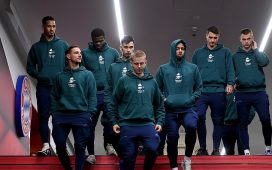The Premier League is set to resume the 2019‑20 season on 17 June, but all the remaining games will be played without fans. It will look and sound like nothing we have seen before. Of course, that’s the way it has to be in order to resume the national game in the middle of a pandemic.
I am sure fans understand this is how it has to be. They have lost friends and loved ones to the virus, some of them are frontline NHS or care workers. All have made sacrifices in adhering to the lockdown, all know the seriousness of this virus and the measures needed to tackle it. They, and the football “industry”, know things have changed dramatically.
In contrast, by insisting that some games be played at neutral venues, it seems the only stakeholder stuck in pre‑pandemic thinking is the police. In particular the National Police Chiefs’ Council, which has led the call for certain fixtures to be played away from a team’s home ground in order to avoid the risk or “threat” of fans congregating and potentially engaging in disorder. For the NPCC this is a double threat: the risk of potential disorder and the threat that the emergency services, at full stretch in the pandemic, would be “overwhelmed” were games to be staged in any other way other than the police’s preferred option of neutral venues.
There are several flaws in this position. Firstly, the major risk is surely one of epidemiology – how best to mitigate the spread of a deadly virus and keep people safe from a public health perspective, as opposed to a risk of public disorder around behind-closed-doors fixtures. When the Bundesliga successfully and safely resumed, its focus was on health. It did not experience widespread issues concerning disorder. In this sense the neutral‑venues argument is based on the unrealistic fear of disorderly fans gathering en masse outside closed football grounds.
Secondly, neutral venues does not address the reality of fan culture. For instance, if (when) Liverpool win the Premier League, or potentially Leeds United get promoted, whole cities will celebrate in their tens of thousands. Potentially these celebrations will take place in the streets, in houses, in parks, regardless of where that final game is actually played. The existing Covid-19 restrictions will allow multiple groups of up to six people to do just that in parks and open spaces anyway, providing that physical distancing is maintained. It is not clear how the neutral-venue position helps to manage these issues.
Forgotten stories of football
Thirdly, the argument for neutral venues presupposes fans will gather in significant numbers outside closed grounds. No evidence has been presented for this rationale. The fan culture expert Dr Geoff Pearson described the notion as “fanciful”. Many remain unconvinced that large numbers of fans would gather at behind‑closed‑doors matches particularly when managers, players and clubs appeal for them to stay away.
Indeed, this is the major flaw with the neutral-venues thinking, the underlying assumptions about the inherently disorderly nature of football fans, as a problem to be managed rather than a solution to be embraced. The neutral‑venues strategy fails to acknowledge that the vast majority of football fans are responsible community‑spirited people who will, in the overwhelming majority, understand the need to stay away and do so.

These are the fans who run foodbanks, mobilise to support the vulnerable, collect for charity and, like everyone else, clapped for the NHS on a Thursday night. If they cannot easily travel, get a beer, or get inside the ground, why do the police think they will gather outside a closed ground for a match that may in any event be televised?
If the police abandon the language of fear there is no reason to pursue a neutral‑venues option. It is an approach that is seemingly struggling to get traction with either the Premier League or English Football League and at least two major police forces (Merseyside and Greater Manchester). The alternative is to keep the resumption local and simple. Clubs, too, will have greater confidence in their own safety and hygiene regimes if they retain ownership and responsibility for them.
Sending their players and staff off to a neutral venue subcontracts that responsibility to someone else, somewhere else. Hosts of the neutral venues will see multiple teams and their staff coming through the doors on a more frequent basis – not the ideal scenario to maintain the necessary hygiene systems.
Perhaps taking into account the whole array of risks that need to be managed, local police forces are best positioned to police behind closed doors in their own ways at their own grounds. That’s where the police-fan relationship is at its strongest after all.
Owen West is a recently retired chief superintendent operational lead for football in West Yorkshire, an experienced match commander and commentator on public order policing.








